BEFORE EVERYONE KNEW THE NAMES of chefs, everyone knew the names of Chicago’s French chefs—Louis Szathmary, Jean Banchet, Jovan Trboyevic. Then American chefs like Charlie Trotter supplanted French food at the high end with a native cuisine (rooted in classic French technique, but not slavish to it), Italian food took much of the middle ground, olive oil replaced butter—and French food has never again ruled the dining scene as it once did.
But it never went away, either. Classic French food kicked off Next’s rotating menus to huge success, and right now one of the hottest openings of the year is Lincoln Park’s The Blanchard, doing lightly modernized takes on everything from duck a l’orange to Napoleons and pistachio bombes at dessert. I sat down at The Blanchard to talk about this with two of Chicago’s top French chefs: Jason Paskewitz, chef of The Blanchard, and Martial Noguier, chef of the Gold Coast’s Bistronomic.
At first glance they couldn’t be more different—Paskewitz, in T-shirt and ballcap and speaking with the broad accent of his native Queens; Noguier, in chef’s whites, with a French accent you just know those Gold Coast ladies love. But they have plenty in common, not least a history in Chicago restaurants going back to 1998, when Noguier was brought in to revive The Pump Room and he hired Paskewitz, who had moved from New York for a job that fizzled out almost immediately, as a sous chef.
Here are their takes on the subject of French food, what it takes to do it properly, where it went and whether it’s coming back… and not least, we talk about those French tire company awards that will be announced tomorrow.
Definitions
Michael Gebert: The French love to define everything very precisely, we know, so first, tell me what kind of French restaurant you have.
Martial Noguier: The idea when I opened my restaurant five years ago was to open a bistro, a bistro gourmand. The reason that I called it Bistronomic, because it was a bistro, economic, and gastronomic. I really wanted to do a bistro [reflecting] what’s happening now in France, in Paris, [which is] that a very good chef, who has worked in two star, three star Michelin, doesn’t want to open a restaurant to get a star. Because they realize when you get the star Michelin, one star, two stars, three stars, it’s impossible to make money. Because you have to have a pastry chef, valet parking, Bernardaud plates, and the cost to have a one star, two star, three star Michelin restaurant is so expensive that nobody wants to do it any more—
Jason Paskewitz: You lose money.
Noguier: You lose money. I don’t know any three star Michelin restaurant that makes money in France. Or maybe in the world. So what they want to do now is to open a bistro. They want to focus on the food. Make sure there are not a lot of people in the kitchen, not a lot of labor because in France also the labor is so expensive. This is the reason I wanted to do a bistro, focus on the food using local farmers, and work with the season.
Paskewitz: I wanted to open a brasserie. What’s the level, bistro, brasserie—it’s a funny definition. And it kind of morphed into this—there’s some bistro feel with the open kitchen, and some brasserie with the size and the sound in this room. But I still think the food defines everything in the end. Being not French, the only way I could judge what I’m doing is by who comes into the restaurant and what I hear. I’ve had quite a few chefs—Jean Joho has been in, Martial has been in, Roland [Liccioni] has been in, and plenty of French guests that come in and say hey, we were just in France, you’re doin’ it right.
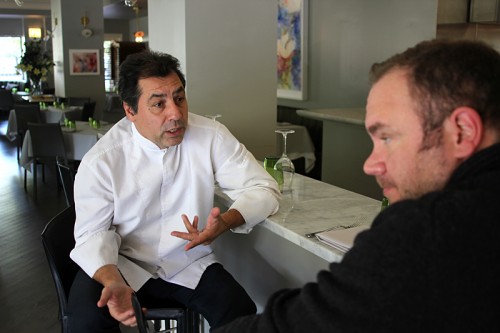
Martial Noguier and Jason Paskewitz
I don’t go to France every summer, but I feel confident in who I learned from—I’m pointing to him [Noguier] and a bunch of other people. I dunno, do you feel this is French?
Noguier: What you’re doing is very smart, yes, the concept is brasserie but you’re doing more than brasserie, you’re doing a little bit of fine dining room, but the price that you charge is for brasserie food.
Paskewitz: I designed it so you could eat here more than once a month, because this is a neighborhood. My last place was a neighborhood bistro [Gemini Bistro] and I would have repeat guests two or three times a week. Now, if you want to gouge yourself, you can, there’s plenty of foie gras. You can get there if you want to.
Michelin
It’s interesting that we jumped straight to Michelin in our discussion of types of French restaurants, because I think what we’ll find, as usual, is that what Chicagoans like—more casual dining—leaves Michelin cold. Meanwhile, it’s hard to say there’s really a market in Chicago for the kind of French restaurant they admire the most.
Noguier: I don’t think Chicago would support a really expensive French restaurant. I don’t think the restaurant will succeed. It has to be very special.
Paskewitz: It has to be very special, it has to be small—and it has to be your second restaurant. Don’t open up that first, small, 30-seat, looking for two Michelin stars restaurant as your first project. Maybe in a year or two from now, we’ll open a 30-seat restaurant, but have something that’s already built a name, so people say we’ve been to The Blanchard or Bistronomic, now they have this super-high-end restaurant, go try it. Or we can say, sorry, we can’t take you at The Blanchard, but we could get you in at… I don’t want to tell you the name yet!
When the first round of Michelins came out, I was talking to Jean Joho [Everest], and he said, “We could get to three stars—we’d just have to spend five million dollars.”
Paskewitz: Not to take away talent from anybody—you still have to cook, and people still have to be trained as pastry chef and sommelier, but the more money you have, the easier it is to get to that point, without a doubt.
Noguier: Maybe it will change because the expectation of the people when they go to a two or three star restaurant—they expect to have a lot of service, and a sommelier, and such—but maybe the expectation will change and they will ask for less. Maybe it will be cheaper for a chef to open a restaurant and get a star, two stars.
Paskewitz: I also think—I don’t want to say Michelin has lowered its bar in coming to the United States, but it’s a lot tougher to get stars in France. I think they’ve changed some of their criteria—not to say that the two guys who have three stars in Chicago don’t deserve it, they do, but there’s a lot of one star, two star restaurants in this country who wouldn’t have gotten it in France. They have to adapt to the local market to build the brand, I guess.
It’s a wonderful accolade to have, but you have to make a decision whether that’s really what you want. I’d rather hang a James Beard medal around my neck.
Why is that?
The James Beard is more recognized throughout the business, and your peers. It’s like an actor in Hollywood, if you’re nominated or win an Academy Award, that’s how you’re always introduced. That’s going to add just as much business to your restaurant, with less pressure about maintaining a star every year.
Noguier: But also, here in Chicago, how many restaurants have gotten one star and closed?
Still, I didn’t build Bistronomic for Michelin, but if someday I were to get a star, I would be very proud. When I was growing up in my country, the chef, the restaurant that got two or three Michelin stars—they were, like, wow—a mentor. Something I dreamed was to try to do what Ducasse or Passard was doing.
Training
Jason, you worked for Martial, so let’s talk about training. How do you train Americans to cook French food?
Noguier: Wow… [he appears to be flummoxed by the question]
Paskewitz: You give them a book called L’Escoffier and tell them to go read it.
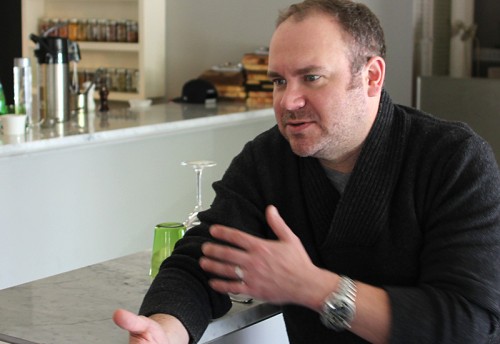
Noguier: Maybe you can answer this for me… First, you know, if I open a new restaurant, or I change the menu for winter or fall, I do the recipes, I do the mise-en-place, I cook it, and after this, when I know everything, I show to the cook or the sous chef the way that I want it.
Paskewitz: We [re]opened the Pump Room together, right after Lettuce Entertain You sold it, and he moved to Chicago to take that role. That was one of the biggest openings I’ve been involved with. And he—”Let me to show you—”
Noguier: “Let me to show you.”
Paskewitz: I heard that quite often. But Martial is a lot better than me at patience, recipes—
Noguier: Organization—
Paskewitz: I don’t know about that, go take a look at my walk-in. But definitely recipes, 100% the books were always there, and that was more because it had to be his way.
Noguier: I don’t care about what you do—
Paskewitz: But don’t fuck it up. He taught me more important things, but more on the food end. He’s one of the most patient French chefs I’ve seen.
With cooks today, everything is instant gratification. Everybody now needs a hug and a kiss at the end of their shift. I’m tired of giving hugs.
Noguier: I think also because I work for Michel Richard for six or seven years, and before Michel Richard became a chef he was a pastry chef. Jean-Louis [Palladin], Alain Ducasse—before they become chefs, they were pastry chefs. When you work in pastry, the recipe is so important, and you need to follow the recipe. It’s not like cooking, cooking you can change every day, using fig for foie gras, you can use cherries, you can use Banyuls, you can use port wine. You can change all the time.
But when you make pâte à choux, or a creme brûlée, you have to follow the recipes. And I think what I learned from Michel Richard when I was his executive chef, was always do a recipe, see if the recipe is not working, if it’s not working, I change. The reason why I do this is that I really believe that when you are a chef, if you do a recipe then anyone can do the recipes. If you are a chef and you are the only person who can do the recipes, then the day that they have to travel or they are not here, it’s not the same food. If I create a recipe, then anyone in the kitchen can make the dish.
So they don’t have to have a background in French technique?
Noguier: It’s in the recipes.
Paskewitz: We cross-train everybody to this day, or else, you’re stuck on that line. Or [the chef] can’t go anywhere. Everybody needs to know how to do everything.
Cooks
One thing I noticed when you were about to open The Blanchard, Jason, was that you were still looking for cooks right before opening. Yet I wouldn’t have guessed any of that from the food. How did you solve that problem?
Paskewitz: I’m still looking for cooks! Eventually they came, once the reviews started to come out. But it’s still hard to find somebody who wants to learn. That person doesn’t exist any more. You come out of culinary school and you’re a chef—and I’m not going to preach too much about that. But it was hard to find cooks because there are restaurant groups downtown that are opening up two, three restaurants a year, more power to ’em, and at the same time there are like five hotels opening up. And they pay so much money. And I can’t bring guys from the past who worked for me for five years over, because they’re making a certain scale now, and when you’re opening a restaurant you can’t afford to pay $18 an hour.
What you have to do now is train people from the beginning. Take a dishwasher or somebody off the street and teach them how to cook. The resumes don’t come flowing in, kids don’t want to come in and stage—I’ve had people come in and say, I don’t want to stage, I know how to cook your food—
Noguier: And I want eighteen dollars.
Paskewitz: And you know what the response is.
It starts with F?
Paskewitz: I’ll use that word a few times.
Noguier: I think it easier for us, you know we are very low key at Bistronomic, all the cooks have been working with us for ten or fifteen years—
Paskewitz: Except for Octavio, you stole him from me.
Noguier: For me, the most difficult is to find somebody who is going to be responsible. Responsible to show up at work, responsible to show up on time, and to do what he is supposed to do is becoming more and more difficult.
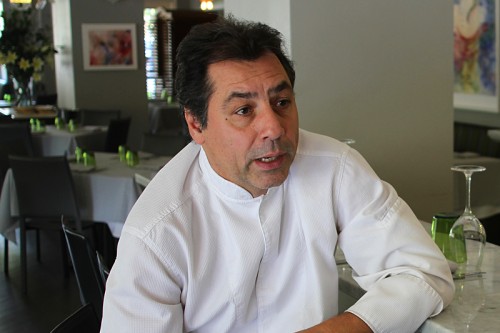
Paskewitz: The more I talk about work and work ethic, the older I sound. But it’s true. It used to be different. When I worked for him I worked eighty hours a week and I didn’t care, my day off was, he used to tell me, you can have between Sunday night and Monday morning. “Yes, chef.”
Noguier: And he was lucky!
Paskewitz: And he paid me so much money. I met Martial on a job interview—I had moved to Chicago and I had a job that didn’t work out. I had had a job at the Four Seasons in New York as a saucier, and I didn’t want to run back to New York, so I called my chef, and the pastry chef at the Four Seasons and Martial were friends from way back, so he told me to talk to Martial, he’s opening up a restaurant. So I go in and interview and he’s like great, how much money do you need to make—my first sous chef job, this is 1998. I say, I’d really like to make $40,000 a year. He says, I’ll pay you $26,000. “Okay. I’ll see you tomorrow!”
Noguier: And I’m sure you were happy.
Paskewitz: Oh, I was excited, I got my name on a coat, and I was opening up a restaurant—it was phenomenal.
With cooks today, everything is instant gratification. I was brought up from the school where no news is good news. If you’re not hearing it, it’s good news! Everybody now needs a fuckin’ hug and a kiss at the end of their shift. You know how many people I have to hug?
Noguier: You’re a babysitter.
Paskewitz: Babysitter, psychologist, teacher, warden, good cop, bad cop—I should wear eight different uniforms. I’m tired of hugging people, man. Now if you yell at someone—the next thing, I go to my sous chef and say, did he walk out yet? Is he still here? “He’s in the walk-in crying, chef. Can you go give him a hug?”
I’m like the last class of the last generation of people who would duck as soon as the chef started yelling. When I went to CIA it wasn’t this glorified college—it was like a military academy with old German and French guys who’d throw a fuckin’ sheet tray at you. If you didn’t shave, they’d shave you. Those days have changed.
Being French in Chicago
So what are the challenges of running a specifically French restaurant?
Paskewitz: I think it depends on what level you take it to. I think I opened this up at the right time. We’ve been planning it for a year or so. Other than a handful of places, there isn’t a lot of great French stuff going on here right now.
My menu is written half in French—mostly English with some French terminology—and no one’s scared of it. I remember, ten years ago, the word was, don’t open a French restaurant, people are scared of it. But you go into any style of restaurant, 85% of the cooking techniques are French. So you use a different word, you used a few different ingredients—it’s all French at the end of the day. That’s where it all started. Even in Asia, the trade routes and what happened with spices and so on, lends itself to French cuisine. In this country, the one true classic American style of cooking is in the South, and New Orleans—hmm, where does that come from?
So there’s no reason for people to be scared of it. I’ve gotten great feedback, and this neighborhood, there’s a lot of diners, a lot of people who eat out quite often, and they appreciate that this is what’s going on, and not another gastropub.
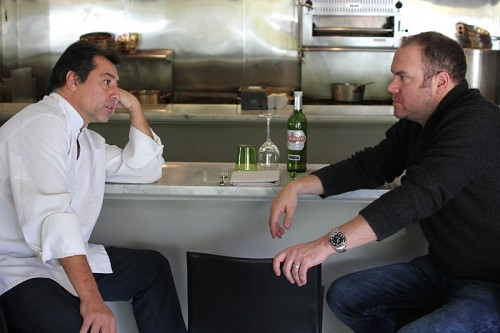
Noguier: I cannot complain about this city, but the biggest problem I have is that when you do French food, people do not think of it as everyday food. When you put the name of “French” on it, people think first about occasion. I am going to come for my birthday, for Christmas. It is not a restaurant for every day. I don’t know why, when people think about French food it is expensive, and it is butter and cream. It’s not true, I can tell you since I opened the Pump Room in 1998, I have never used too much butter or cream. It’s not true that you can’t eat it every day.
Paskewitz: You’re not eating cassoulet every night.
Noguier: Or choucroute.
Paskewitz: Wish I could.
So you think people aren’t as intimidated by French food any more?
Paskewitz: With all the cooking shows on TV, and everyone’s a foodie now, it’s become a little—no, really it’s become very cool to know how things are made. I talk to so many tables now, where they ask “How did you make that torchon? Because I tried to make that at home—” You tried to make a torchon at home? Well, good for you….
But everyone’s a chef nowadays. And TV has created that—
Noguier: A chef or a critic.
Paskewitz: And I love that. I don’t see why there aren’t more French restaurants.
Noguier: But it’s good for us. When you look at how many French restaurants there are open in the last two years, [versus] how many Italian restaurants or Japanese restaurants there are—I’m glad that I’m doing French food.
Paskewitz: I’ll say it, you’re going to see more French places pop up. And whether it’s because of him or the success of this place, I’m not shy about saying that. But also, with the French restaurant has to come the chef. And with that comes so much more than just writing recipes, or expediting at night. That’s one of the things Martial really taught me was how to be a chef, how to be proud of that, how to wear your apron, be clean.
You don’t see a cop out on the street in his uniform with his badge and his gun and food all over him—well, maybe some cops. But to be clean and be proud of that and to command that respect. And to command that respect you have to earn it. It comes with a lot of training, and a lot of hard work. I’m not talking about a year at Kendall College, and then jumping out there and sous-viding stuff and putting things in a dehydrator and thinking you’re the best thing since sliced bread. There’s so much more behind it.
Michael Gebert is the très bon editor of Fooditor.
Latest
Join the Discussion
After you comment, click Post. If you're not already logged in you will be asked to log in or register with Disqus.




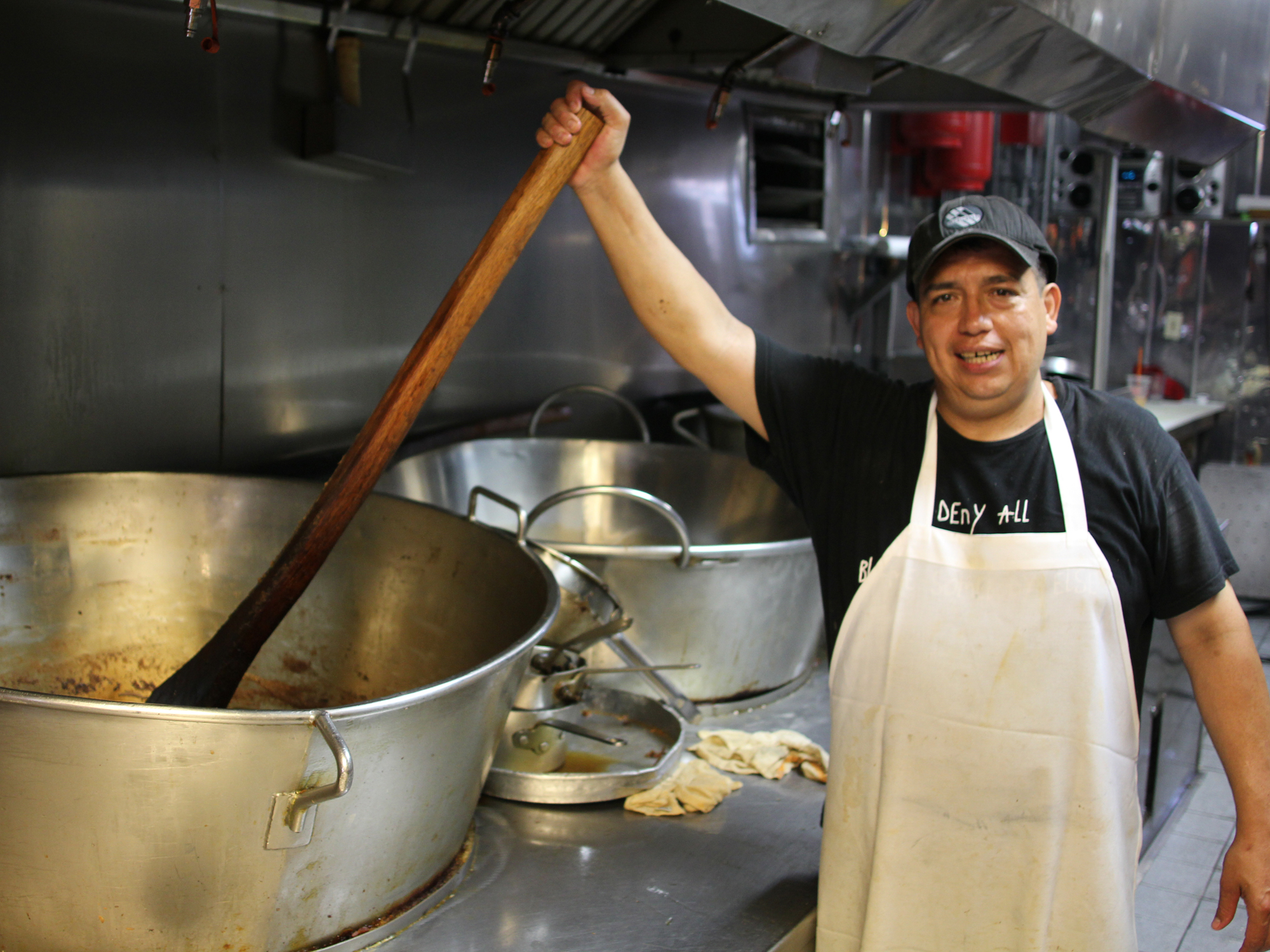

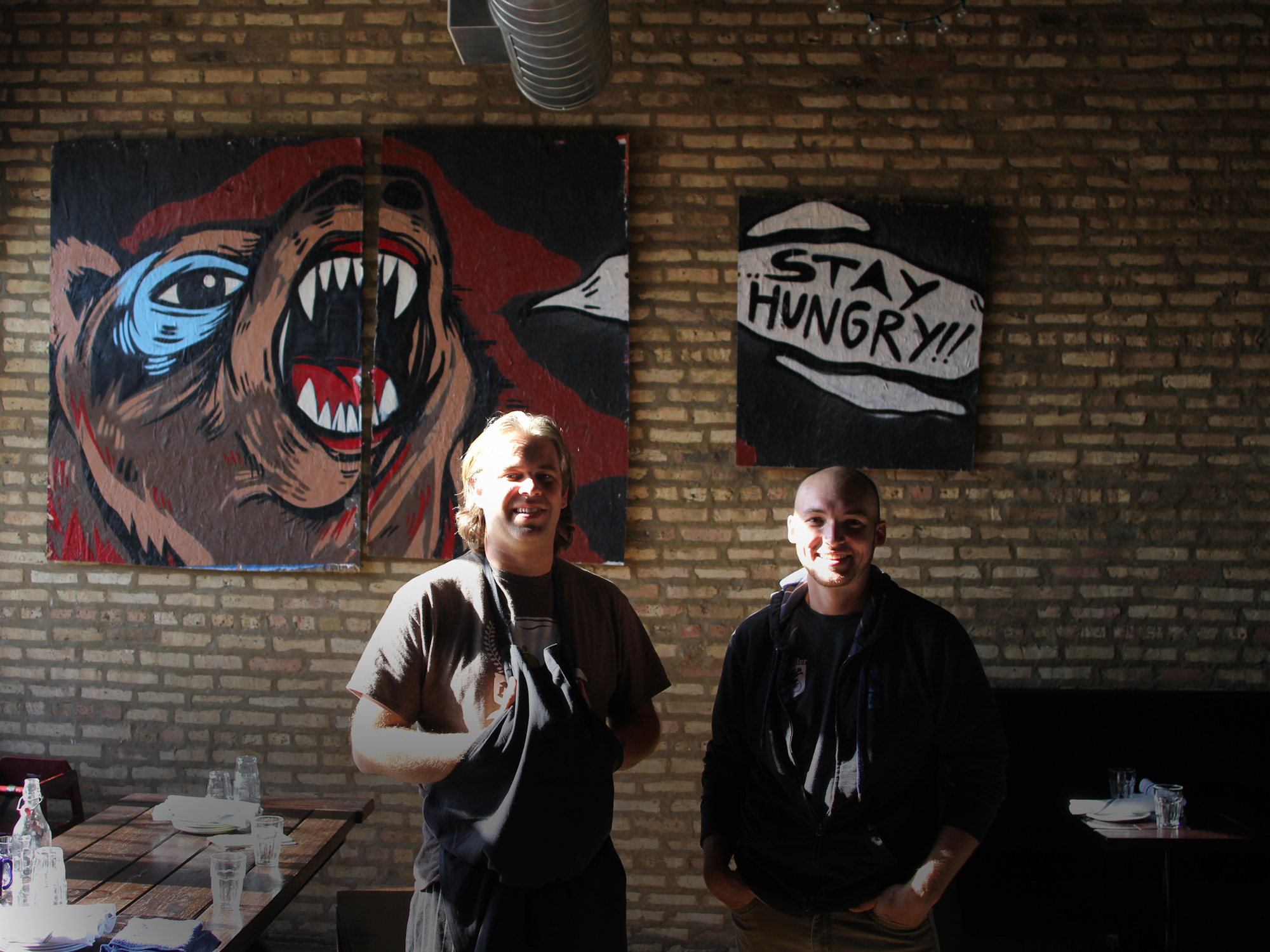
“I don’t want to say Michelin has lowered its bar in coming to the United States, but it’s a lot tougher to get stars in France. I think they’ve changed some of their criteria” I dunno. Sounds like he’s saying exactly that.